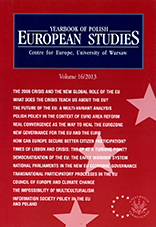Democratising the European Multi-level Polity? A (Re-)Assessment of the Early Warning System
Democratising the European Multi-level Polity? A (Re-)Assessment of the Early Warning System
Author(s): Karolina Borońska-HryniewieckaSubject(s): Politics / Political Sciences
Published by: Centrum Europejskie Uniwersytetu Warszawskiego
Summary/Abstract: One of the main promises of the Treaty of Lisbon was to increase the democratic legitimacy of the European Union through strengthening the role of national parliaments in EU policy-making under the so-called ‘Early Warning System’ (EWS) for subsidiarity control. However, introduction of the EWS has met with some criticism in the academic literature. Scholars claim that the mechanism not only fails to alleviate the democratic deficit, but it also obfuscates the existing channels of delegation and accountability in the EU. Moreover, it has been predicted that the EWS will remain a mere ‘window dressing’, largely unexploited by national assemblies, let alone the subnational parliaments. This article addresses the above-mentioned criticisms four years after the entry into force of the Lisbon provisions. On the basis of an empirically grounded analysis, this article identifies and evaluates positive effects of the EWS with respect to both the input and output legitimacy of the EU. The article posits that the unintended (spill-over) effects of the EWS allow for its broader conceptualisation as (1) a disciplining tool for a better regulatory environment; (2) a representation and accountability enhancing mechanism; (3) an opportunity structure for increasing parliamentary control of the executive and (4) a Europeanization mechanism.
Journal: Yearbook of Polish European Studies
- Issue Year: 2013
- Issue No: 16
- Page Range: 167-187
- Page Count: 21
- Language: English

